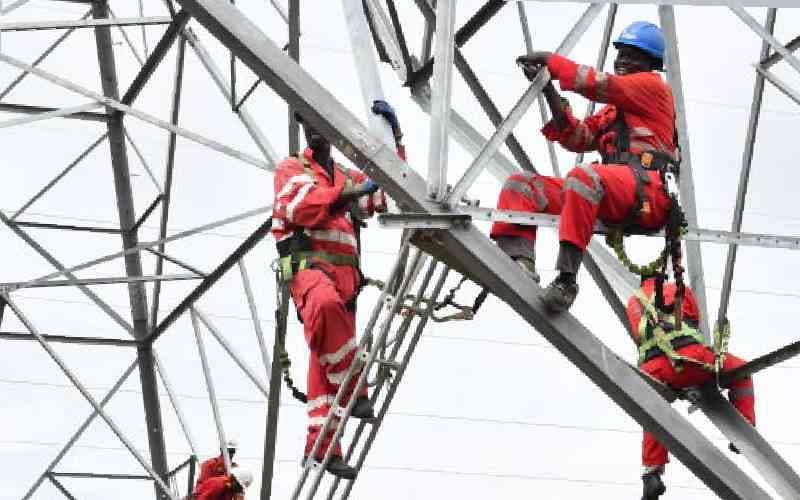We're loading the full news article for you. This includes the article content, images, author information, and related articles.
Taxpayers are set to pay billions in penalties after the abrupt termination of a major power transmission contract, revealing a costly pattern of failed state projects and financial mismanagement at the Kenya Electricity Transmission Company (Ketraco).

The Kenyan taxpayer is facing a potential Sh7.3 billion liability following the cancellation of a Sh96 billion contract between the Kenya Electricity Transmission Company (Ketraco) and India's Adani Energy Solutions. The government is currently in negotiations with the Adani Group for a compensation package after President William Ruto verbally terminated the deal in November 2024. This decision followed the indictment of Adani Group founder, Gautam Adani, by United States authorities on charges of bribery and fraud.
According to the Treasury's Public-Private Partnership (PPP) Directorate, the government is pursuing a "mutual separation agreement" rather than a formal termination to minimise the financial fallout. Legal experts estimate that a formal termination could cost taxpayers at least Sh5 billion in compensation. The final figure remains under negotiation, but this incident adds to a growing list of expensive contract breaches that have cost Kenyans billions. Previous cancellations include an Sh8.9 billion payout to Chinese contractors for the Jomo Kenyatta International Airport (JKIA) second terminal, Sh6.19 billion to Israeli firm SBI International Holdings for contract breaches, and a Sh6.2 billion settlement with French contractors over a terminated roads project.
Signed in October 2024, the 30-year Public-Private Partnership (PPP) would have seen Adani Energy Solutions build, own, and operate critical power infrastructure before transferring it to Ketraco. The project included a 206-kilometre, 400kV transmission line from Gilgil to Konza and several substations intended to stabilize the power supply around Nairobi. Under the agreement, the Adani Group was projected to earn an estimated Sh21.2 billion annually, a cost that would have been passed on to consumers through a wheeling charge on electricity bills. The deal, however, was fraught with controversy from the start, facing legal challenges from the Law Society of Kenya over a lack of transparency and public participation. A court had suspended the contract in October 2024, the same month it was signed.
President Ruto announced the cancellation during his State of the Nation address, citing "new information provided by our investigative agencies and partner nations" following the US indictment against Gautam Adani. Despite the cancellation, Treasury officials have confirmed that the country may still be exposed to financial penalties for the Ketraco deal, which had progressed further than a separate, also cancelled, JKIA expansion proposal with the same company.
The Adani deal's collapse occurs against a backdrop of severe financial mismanagement and operational failures at Ketraco, as documented in successive reports by the Auditor-General. An audit for the financial year ending June 30, 2023, revealed that taxpayers lost over Sh6.9 billion in unwarranted expenditures due to project delays and poor planning at the state-owned entity. Auditor General Nancy Gathungu highlighted numerous instances of avoidable costs, including a Sh417 million fine for the delayed commissioning of the Kenya-Ethiopia power-sharing project and Sh85 million in storage costs for transformers for a terminated project.
Ketraco has a documented history of project delays, with a 2020 report from the Auditor-General flagging four key projects worth Sh24 billion that were significantly behind schedule. The company is also embroiled in costly legal disputes, including a Sh4.5 billion arbitration award to Spanish contractor Instalaciones Inabensa for wrongful contract termination on the Lessos-Tororo line. Furthermore, the company faces intense scrutiny from Parliament over ballooning liabilities nearing Sh13 billion and significant delays in compensating landowners for wayleaves, which further stalls critical infrastructure projects. These systemic issues at Ketraco create a high-risk environment for large-scale projects, ultimately burdening the Kenyan public with the financial consequences of failed contracts and inefficient management.
The failure of the Ketraco-Adani PPP highlights the significant financial risks to the public from inadequately vetted, large-scale infrastructure deals. While the government's move to cancel the contract was prompted by international integrity concerns surrounding the Adani Group, the lack of a clear exit strategy without incurring massive penalties underscores potential weaknesses in contract negotiation and due diligence processes. The recurring cycle of project cancellations and subsequent multi-billion shilling payouts places a direct and heavy burden on Kenyan taxpayers, diverting funds that could be used for essential services. For the East Africa region, the delay in upgrading Kenya's transmission backbone could impact future plans for regional power trade and grid stability. As Ketraco seeks alternative partners, the episode serves as a critical lesson on the importance of transparency, rigorous due diligence, and robust contractual safeguards to protect public interest in major infrastructure development.
Keep the conversation in one place—threads here stay linked to the story and in the forums.
Other hot threads
E-sports and Gaming Community in Kenya
Active 9 months ago
The Role of Technology in Modern Agriculture (AgriTech)
Active 9 months ago
Popular Recreational Activities Across Counties
Active 9 months ago
Investing in Youth Sports Development Programs
Active 9 months ago
Key figures and persons of interest featured in this article